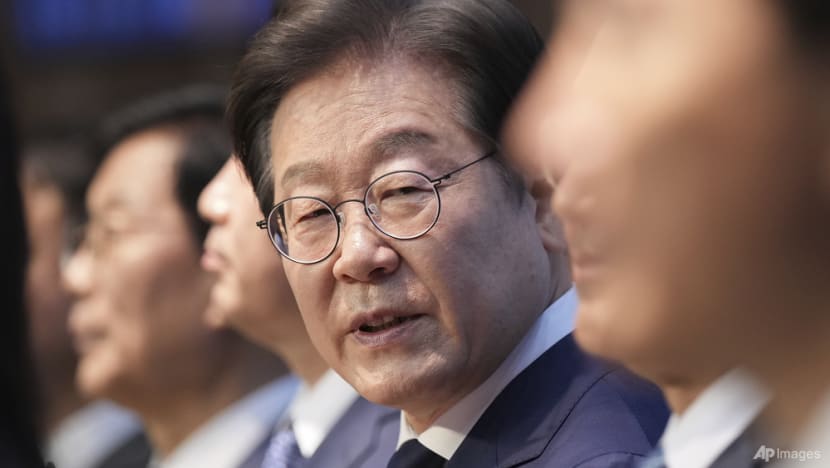Commentary
As South Korea heads for a snap presidential election on Jun 3, frontrunner Lee Jae-myung is signalling a return to diplomacy with Pyongyang – and greater caution on entanglement in US-China tensions, says professor of political science Robert Kelly.

Former South Korea’s main opposition Democratic Party leader Lee Jae-myung speaks about his presidential bid to the media at National Assembly in Seoul, South Korea, on Apr 11, 2025. (AP Photo/Lee Jin-man)
New: You can now listen to articles. 
This audio is generated by an AI tool.

14 Apr 2025 06:00AM (Updated: 14 Apr 2025 10:05AM)
BUSAN: South Korea’s most recent conservative president, Yoon Suk Yeol, has been impeached and removed. Mr Yoon declared martial law without warning on Dec 3, pitching the country into a major constitutional crisis. Not since South Korea was a dictatorship in the 1980s has a president sought to rule outside the constitution.
The South Korean public rallied against this power grab. The national legislature quickly impeached Mr Yoon, and just this month the country’s highest court confirmed that impeachment. South Korea now has an acting president, and a snap election has been set for Jun 3.
The current frontrunner is Lee Jae-myung, Mr Yoon’s chief competitor in the last election, in 2022. Mr Lee, a progressive, officially declared his bid for the presidency on Apr 10.
Given his strong showing in 2022 – he lost by less than one percentage point – and the backlash brought on the conservatives by Mr Yoon’s actions, Mr Lee and the left are widely expected to win.
In 2017, another South Korean conservative president was impeached and removed, followed by a progressive presidential victory. It seems reasonable to suggest that history will repeat itself.
LEE WILL DRAMATICALLY RE-ORIENT SOUTH KOREAN FOREIGN POLICY
South Korea’s left and right are sharply polarised – not just on domestic issues, but most acutely on foreign policy.
The South Korean right views North Korea as an existential threat to South Korean democracy and is deeply suspicious of China.
During Mr Yoon’s impeachment, conservative pro-Yoon protestors circulated videos claiming that the Chinese Communist Party was behind the impeachment. On the streets, they waved “stop the steal” signs – borrowing from United States President Donald Trump’s election tactics, but with a local spin that China was sabotaging South Korean politics.
Mr Yoon was very sympathetic to this messaging. He was quite hawkish on both North Korea and China. He and former US president Joe Biden had a very successful summit because of their shared threat assessment.
The US foreign policy community, including America’s liberals, have long been deeply hostile to North Korea. And in the last decade, Washington has turned sharply against China too.
There is now a hawkish US foreign policy consensus on both North Korea and China. Mr Yoon shared those beliefs, which helped stabilise the US-South Korea relationship.
Mr Lee is quite different. South Korea’s progressives seek detente with North Korea. In the Korean context, this effort is known as the “Sunshine Policy”.
South Korea has now had three progressive presidents. Each has pursued “sunshine”, with each detente effort becoming more generous toward the North. Mr Lee is a friend of the last progressive president, Moon Jae-in. Mr Lee is widely expected to try “sunshine” for a fourth time. This will likely cause a rift with the US, as it did under Mr Moon.
South Korea’s progressives are also wary of the South’s entrapment into Sino-US competition. US Defense Secretary Pete Hegseth toured Asia last week, arguing to US regional allies that China is now America’s overriding security concern. China is a peer competitor with the US, a near-superpower unlike any American challenger since the days of the Cold War. Issues like North Korea, terrorism, and the Ukraine War are now secondary.
While this will go down well with US allies deeply worried about China – like Japan, Australia and the Philippines – it does not move the South Korean left.
Mr Lee has also publicly questioned South Korea’s role in any future conflict over Taiwan, signalling he may adopt more China-friendly policies than Mr Yoon.
For it, the overriding issue of South Korean foreign policy is the stalemate on the Korean peninsula, and the best way forward is to conciliate North Korea via outreach.
South Korea’s participation in a US-led anti-Chinese coalition will only worsen Chinese support for North Korean intransigence. South Korea should, instead, distance itself from the US on China so that China, in turn, will distance itself from North Korea. This would create space for the two Koreas to find their own separate peace.
US-SOUTH KOREAN ALLIANCE
Mr Lee’s foreign policy instincts portend a major alliance crisis.
If disputes between the US and China escalate into a war, there would be disastrous consequences. The US would expect all its allies to help. Those who do not would immediately lose their American security guarantee, mostly importantly the US nuclear umbrella.
If South were to defect on the US alliance in such a time of need, the US would withdraw its forces immediately, and South Korea would be left alone.
South Korea has the wealth to defend itself alone, but the costs would be enormous. The US provides a lot of logistical and intelligence support to the South now, which would be very costly to replace. South Korea today spends about 2.7 per cent of GDP on defence. Post-US alliance, that number would double or even triple, including the likely development of nuclear weapons.
The progressive answer is that such a build-up would be unnecessary, because a neutral South Korea could strike deals with North Korea and China. Mr Moon, for example, proposed Korean unification by 2045, which would obviate the North Korea problem altogether.
This is a solution, but a hazardous one. China appears to have regional hegemonic aspirations, and North Korea did not respond to the three previous rounds of sunshine. There is no obvious reason to think it will respond better this time.
South Korean public opinion is deeply wary of both countries and generally pro-American. Mr Lee’s foreign policy instincts seem likely to worsen domestic polarisation and alliance tensions.
Robert Kelly (@Robert_E_Kelly) is a professor of political science at Pusan National University.
